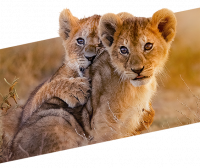FAQs About LionAid
Frequently Asked Questions about LionAid the charity
Q:What are the major threats to lions, and what will Lion Aid do to alleviate those

“
The major threats to all wild African lions are:
-
The massive growth in human populations. The African National Parks and Reserves had their origins in colonial times. These days, because of economic pressures, very many of those protected areas have become little more than paper Parks - in other words they have ceased to exist in terms of effective wildlife conservation. LionAid is working hard with a number of African partners to minimise the effect of human/wildlife conflict and to work with African partners so that currently struggling nationally protected areas will be revived in the future.
-
There is a very high rate of infection among lions with Feline Immunodeficiency Virus (Feline Aids) that shortens their life and compromises reproduction. That infection also pre-disposes lions to infection with a number of other diseases, most notably, canine distemper that killed over 1,000 lions in the Serengeti National Park in 1984. LionAid, with collaborators, is engaged in research of feline immunodeficiency virus and with other collaborators is attempting to minimise exposure of lions to diseases transmitted by domestic animals - such as canine distemper and bovine tuberculosis.
-
Lions also suffer from a tremendous decrease in natural prey caused by out of control bushmeat poaching across the entire lion range. We are working with partners to attempt to reduce such bushmeat poaching especially by a means to allow rural communities to have access to food resources that do not involve poaching.
-
As we stated in answers to other FAQs, LionAid is working tirelessly to prevent unnecessary and additive mortality from trophy hunting.
-
As stated above, LionAid is working with our associates to reduce human/lion conflict by implementing tried and tested means to protect cattle in their bomas at night and is also working with Governments in Tanzania, Botswana and Kenya on their land use planning that reduces potential conflict between livestock and lions.
-
LionAid has recently initiated a highly innovative project with the Maasai community living next to Kenya's Amboseli National Park to reduce lion/livestock conflict.
”



